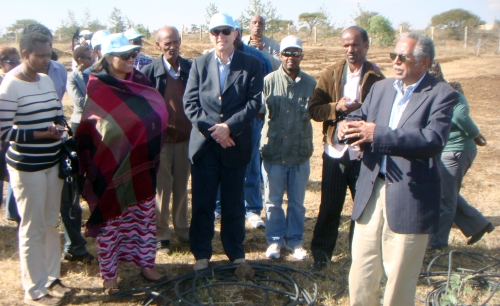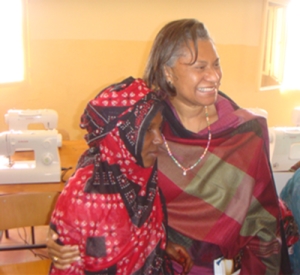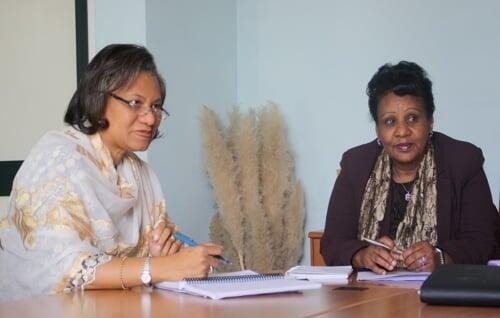ASMARA, Eritrea, 20 December 2013 — Eritrea’s approach to its health programme has enabled the country to achieve Millennium Development Goals 4 and 5. However, these gains must be met with continued vigilance, said Dr. Julitta Onabanjo, United Nations Population Fund (UNFPA) Director for the East and Southern Africa Region.
At a meeting with the Eritrean Health Minister, Amina Nurhussein, Dr. Onabanjo called for appropriate programming supported by gender disaggregated data, with special attention being paid to youth issues, family planning and the plight of adolescent girls. She said the next Demographic and Health Survey should be an all-inclusive process, to ensure that the data produced were relevant to all.
Dr. Onabanjo was visiting the country at the invitation of the Eritrean Government, as part of a delegation from the United Nations Development Group comprising UN Directors from East and Southern Africa. The goodwill mission was in support of the work of the UN in Eritrea, and to express solidarity with the Government of Eritrea and its people. The delegation consisted of six Regional Directors from UNDP, UNICEF, UNFPA, ILO, IOM, and WFP, and was led by Abdoulaye Mar Dieye, Assistant Secretary General, Director UNDP Regional Bureau for Africa and Chair of the United Nations Development Group for Africa.

The delegation met with the Eritrean President, Isaias Afewrki, to discuss how the UN system could strengthen its support to the country’s sustainable development agenda. In this respect, Mr. Abdoulaye Mar Dieye said the UN was committed to ensuring results and creating an impact in Eritrea.
The delegation visited various UN-supported projects in health, water, food security and sustainable livelihoods in Zobas Debub and Maekel. The projects showcased Eritrea’s progress in meeting the health-related MDG targets and enhancing the livelihoods of the people of Eritrea through active community participation and ownership.

During the mission, Dr. Onabanjo met UNFPA implementing partners NSO NUEW and the Minister of Health, Amina Nurhussein. Ms.Nurhussein said she was satisfied with UNFPA’s support to the comprehensive Maternal Health Programme, which focuses on safe motherhood through the arranging of activities, including maternity waiting homes and providing support to the National Fistula Programme.
Christine Umutoni, Resident and Humanitarian Coordinator of the UN in Eritrea, said the delegation sought to strengthen the relationship between Eritrea and international development partners. “The UN will continue to pursue opportunities and provide support where it can to accelerate this process and facilitate greater interaction between Eritrea and the international community,” she said.
The United Nations in Eritrea partners with the Government of the State of Eritrea in the priority areas of basic social services, national capacity development, food security and sustainable livelihoods, environmental sustainability and gender equity, and advancement of women under the Strategic Partnership Cooperation Framework (SPCF 2013-2016). The SPCF capitalises on the collective comparative strengths of the UN system in responding to the identified priority areas and enhancing the overall well-being of the people of Eritrea, including the most vulnerable.


